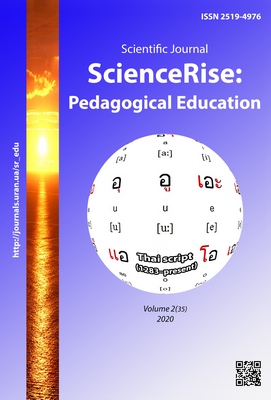Peculiarities of inclusive education organization in Europe and Ukraine
DOI:
https://doi.org/10.15587/2519-4984.2020.199146Keywords:
inclusion, inclusive education, special educator, child with special educational needsAbstract
Providing the necessary corrective assistance to children with special educational needs is the most important task of educational institutions in the system of inclusive education in Ukraine and in the world. The article describes the features of organization of inclusive education in the countries of the world and Ukraine. The basic literature on the problem is analyzed and features of organization of inclusive education in researches of scientists are revealed. On the basis of literature analysis, the essence of the concept of inclusion is investigated. The functioning of inclusive education institutions in the world is analyzed and a brief description of the features of the organization of inclusive education in the world is given. The basic tendencies of development of inclusion and principles of its realization are characterized. Analyzing the results of the research and scientific positions of scientists, we identified the main trends in the development of inclusive education. Inclusion, as an educational concept, is constantly evolving and is important for policy and strategies to address the causes and consequences of discrimination, inequality and exclusion.
Inclusive education is based on a concept that eliminates any discrimination against students with disabilities and creates good conditions for quality education, upbringing and development for such children. Educators and scholars, who introduce the foundations of inclusive education into modern schools, recognize that every child can fully learn, and certain characteristics of people with disabilities are worthy of respect and should be a source of educational work for all participants in the educational process.
Inclusive education in the world has been developing very rapidly for many years, teaching children with psycho-physical development peculiarities is in accordance with the principles, established by scientists. For Ukraine, inclusive education is a pedagogical innovation and, at the same time, a requirement not only of time, but also since the ratification of the UN Convention on the Rights of Persons with Disabilities - one of the international obligations of the state
References
- Savinova, N. V. (2016). Problemy pidhotovky maibutnikh korektsiinykh pedahohiv do roboty v umovakh inkliuzyvnoho navchalnoho zakladu. Aktualni problemy korektsiinoi osvity. Available at: http://aqce.com.ua/download/publications/96/69.pdf/ Last accessed: 18.06.2018.
- Synov, V. M., Sheremet, M. K. (2015). Osnovni tendentsii modernizatsii pidhotovky korektsiinykh pedahohiv v umovakh reformuvannia osvitnoi haluzi. Pedahohichni nauky: teoriia, istoriia, innovatsiini tekhnolohii, 7, 390–396.
- Broderick, A., Mehta-Parekh, H., Reid, D. K. (2005). Differentiating Instruction for Disabled Students in Inclusive Classrooms. Theory Into Practice, 44 (3), 194–202. doi: http://doi.org/10.1207/s15430421tip4403_3
- Budnyk, O. B. (2014). Action-technological readiness of future primary school teacher for social and educational activity (based on the results of experimental study). Science and Education a New Dimension. Pedagogy and Psychology, II (22 (11)), 6–10.
- Davydenko, H. (2015).Organization of resource center for inclusive high education. Creative thinking in the special education: Training Course MASHAV. Shfaim.
- Volonino, V., Zigmond, N. (2007). Promoting Research-Based Practices Through Inclusion? Theory Into Practice, 46 (4), 291–300. doi: http://doi.org/10.1080/00405840701593873
- Kolupaieva, A. A. (Ed.) (2012). Osnovy inkliuzyvnoi osvity. Kyiv: «A.S.K.», 308.
- Lohvin, T. V. (2018). Rol asystenta vchytelia u navchalno-vykhovnomu prostori dytyny z osoblyvymy osvitnimy potrebamy. Available at: https://naurok.com.ua/rol-asistenta-vchitelya-u-navchalno-vihovnomu-prostori-ditini-z-osoblivimi-osvitnimi-potrebami-31824.html Last accessed: 17.03.2018
- Bilodid I. K. (Ed.) (1970–1980).Slovnyk ukrainskoi movy. Vol. 11. Kyiv: Naukova dumka, 678.
- Akademichnyi tlumachnyi slovnyk ukrainskoi movy. Available at: http://sum.in.ua Last accessed: 15.11.2017
- Salamankskaia deklaratsiia i ramki deistvii po obrazovaniiu lits s osobymi potrebnostiami, priniatye Vsemirnoi konferentsiei po obrazovaniiu lits s osobymi potrebnistiami: dostup i kachestvo, Salamanka, Ispaniia, 7–10 iiunia 1994 goda (2000). Kyiv, 21.
- Martynchuk, O. V. (2018). Pidhotovka fakhivtsiv zi spetsialnoi osvity do profesiinoi diialnosti v inkliuzyvnomu osvitnomu seredovyshchi. Kyiv: Tsentr uchbovoi literatury, 430.
Downloads
Published
How to Cite
Issue
Section
License
Copyright (c) 2020 Mariya Berehova

This work is licensed under a Creative Commons Attribution 4.0 International License.
Our journal abides by the Creative Commons CC BY copyright rights and permissions for open access journals.
Authors, who are published in this journal, agree to the following conditions:
1. The authors reserve the right to authorship of the work and pass the first publication right of this work to the journal under the terms of a Creative Commons CC BY, which allows others to freely distribute the published research with the obligatory reference to the authors of the original work and the first publication of the work in this journal.
2. The authors have the right to conclude separate supplement agreements that relate to non-exclusive work distribution in the form in which it has been published by the journal (for example, to upload the work to the online storage of the journal or publish it as part of a monograph), provided that the reference to the first publication of the work in this journal is included.







